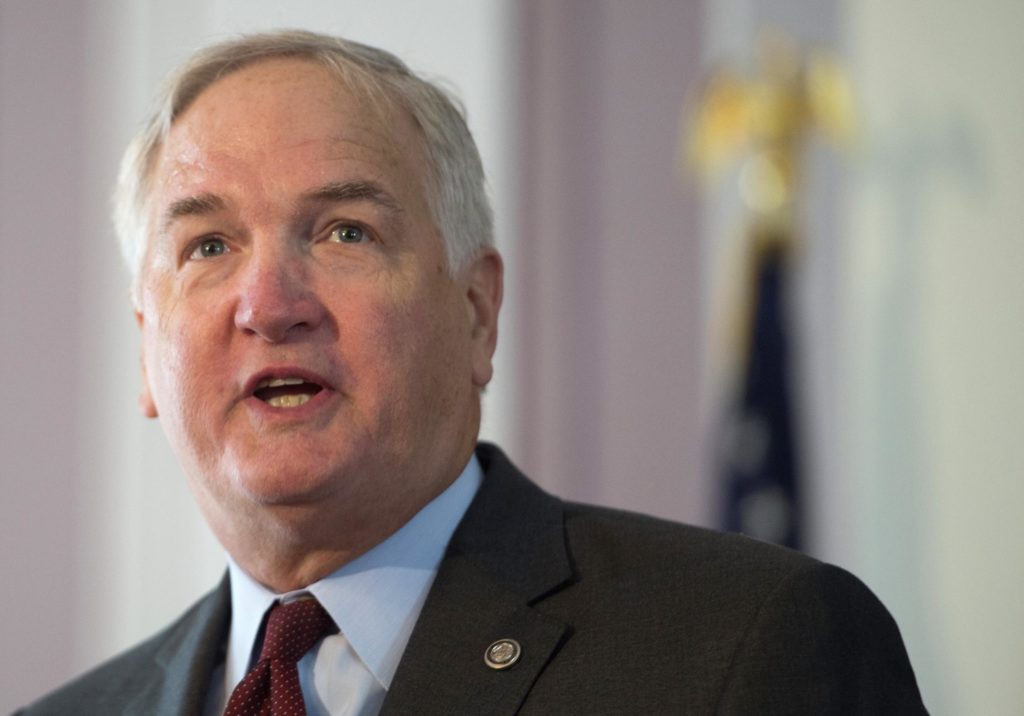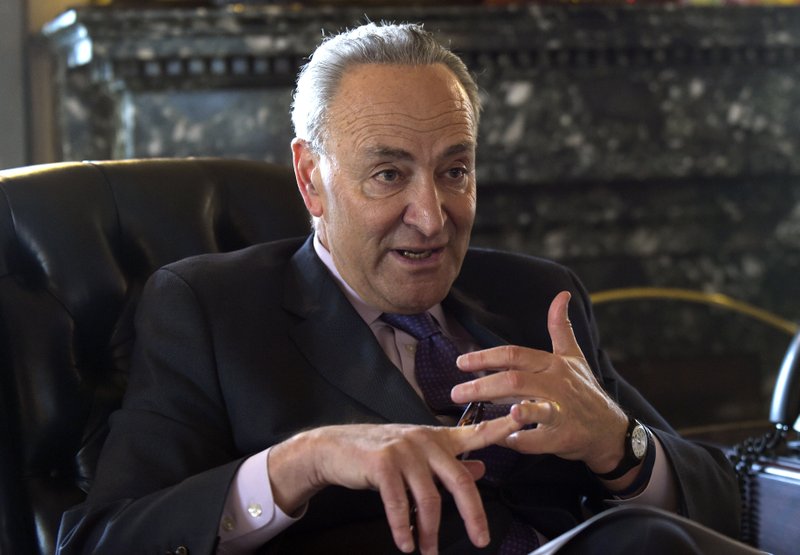Mo Brooks, House Freedom Caucus nonplussed over Donald Trump threats

President Donald Trump was nonplussed with members of the House Freedom Caucus after Republicans were forced to pull the American Health Care Act after realizing it didn’t have the votes to pass. In a Thursday tweet, Trump even threated to oppose the conservative Republican group with the same vigor as Democrats in 2018 if they don’t fall in line with his priorities. “The Freedom Caucus will hurt the entire Republican agenda if they don’t get on the team, & fast. We must fight them, & Dems, in 2018,” Trump wrote. Alabama U.S. Rep. Mo Brooks, a member of the ultraconservative caucus, doesn’t seem worried though. “Trump’s tweets reaffirm that the Freedom Caucus is having a major impact on public policy in Congress — that the Freedom Caucus is not a force to be ignored,” he said in an interview with The Daily Signal. “This Twitterverse is the new Washington. I have zero worries about it. If you want me to vote for a piece of legislation, either persuade me it is good for America or change it so that it is good for America.” Brooks likely doesn’t have much to worry about in 2018, either. The CD 5 Republican has been in the House of Representatives since 2011 and in his most recent election he doubled the vote count of Democratic challenger Will Boyd.
Luther Strange takes a stands for religious freedom

While he may be new to the U.S. Senate, Luther Strange is not wasting any time making his priorities known. On Friday, he announced that he joined his new Senate colleagues and sent a letter to President Donald Trump urging him to issue an executive order protecting religious freedoms. Specifically, the letter calls for the exemption of religious organizations like the Little Sisters of the Poor from the Obamacare preventative services mandate, and protects religious organizations from discrimination in grants, contract access, and tax exempt status based on their beliefs. “Upholding religious liberty is the responsibility of all who take an oath to preserve, protect, and defend the Constitution of the United States,” said Strange. “From healthcare to charitable giving, religious organizations and individuals across America work every day to improve and enrich the lives of millions of people. I am proud to stand up for their rights, and I look forward to working with the President to ensure that they can continue to live out this noble calling, free from government overreach.” The letter began by establishing the importance of protecting America’s religious freedom as enshrined in the First Amendment to the United States Constitution. We “From the earliest stages of our nation’s founding to today, Congress and the Executive Branch have repeatedly acted to preserve and affirm the right of individuals to express freely and act on their religious beliefs,” the letter read asking Trump to issue an order without delay. The letter also praises Trump for his stance on protecting the religious liberty of Americans, including his defense the rule of law and bringing federal agencies into compliance with the law as written by Congress “Religious freedom was a founding principle of this nation and is a value that we have exported to the rest of the world,” the letter states. “We have a responsibility to protect and defend the free exercise of religion for people of all faith both here and around the world. We appreciate your consideration of this request and look forward to working with you on this vital issue.”
Jeff Sessions: Ferguson emblem of tense relationship with police

Ferguson, Missouri, has become “an emblem of the tense relationship” between law enforcement and those it serves, especially minority communities, Attorney General Jeff Sessions said Friday during a visit to St. Louis. Sessions, speaking to a gathering of law enforcement leaders at the federal courthouse that sits roughly 12 miles from Ferguson, said the Justice Department will work with them to battle the rising tide of violent crime in America. He said he supports “proactive, up-close policing — when officers get out of their squad cars and interact with everyone on their beat — that builds trust, prevents violent crime, saves lives and creates a good atmosphere.” But Sessions said that sort of police work has become increasingly difficult in what he called “an age of viral videos and targeted killings of police.” “Unfortunately, in recent years law enforcement as a whole has been unfairly maligned and blamed for the crime and unacceptable deeds of a few in their ranks,” Sessions said. “Amid this intense public scrutiny and criticism, morale has gone down, while the number in their ranks killed in the line of duty has gone up.” Ferguson, he said, has become “an emblem of the tense relationship between law enforcement and the communities we serve, especially our minority communities.” Ferguson became a flashpoint after 18-year-old Michael Brown, who was black and unarmed, was killed by white officer Darren Wilson on Aug. 9, 2014. Months of often violent protests followed the shooting. A St. Louis County grand jury and the Justice Department cleared Wilson of wrongdoing in November 2014, and he resigned that same month. But the Justice Department investigation under then-Attorney General Eric Holder found significant racial profiling and bias in both Ferguson’s police department and municipal court. The city and the Justice Department settled a lawsuit last year that requires significant changes in policing. That process is ongoing. Sessions is taking a far different approach than Holder. Civil rights investigations of police were common during the Obama administration. Sessions has suggested that civil rights investigations hinder police, causing them to back off out of fear of scrutiny of their every move. In fact, some have labeled the phenomenon the “Ferguson Effect.” Ferguson Police Chief Delrish Moss, who attended the speech, said he was encouraged by Sessions’ commitment to battling violent crime. And Moss believes the Justice Department remains steadfast in working with Ferguson leaders to eliminate racial bias. “We’re working with the Department of Justice, in fact, on a weekly basis,” Moss said. “They remain as committed as they always have been to the reforms we’ve agreed upon.” President Ronald Reagan chose Sessions for a federal judgeship in the 1980s, but the nomination was rejected amid concerns about racially charged comments and his failed prosecution of three black civil rights activists on voting fraud charges. Denise Lieberman, a St. Louis lawyer with the civil rights group Advancement Project, said Sessions’ approach is concerning at a time when allegations of violence by police are at an all-time high. “We also know that the role of the Department of Justice is absolutely critical to ensuring that policing agencies are complying with the law, and they are a crucial step in bringing accountability to policing,” Lieberman said. “We see that right here in Ferguson.” Sessions told the St. Louis audience he has ordered the creation of a crime-fighting task force that brings together the leaders of the FBI, DEA, ATF and U.S. Marshals Service. He said battling the heroin and opioid epidemic is a crucial element of the fight to stem violent crime. Republished with permission of The Associated Press.
Daniel Sutter: Coverage mandates and the cost of health insurance

The Republican effort to repeal and replace the Affordable Care Act (ACA) has stalled for now. The ACA’s effects on the insurance market include over ten categories of essential health benefit mandates. States impose numerous additional mandates on health insurance. How do mandates affect the cost of health insurance? Mandates require all policies to cover specified procedures and treatments. One example is the ACA’s mandatory coverage of all FDA approved methods of contraception without a co-pay or deductible. Eligibility for Federal subsidies provided the legal lever for ACA mandates, while states impose mandates as part of insurance regulation. Once imposed, mandates incur costs as policyholders receive covered treatments. These costs are covered by premiums charged to all policyholders. Premiums must also cover insurers’ administrative costs. Are the ACA’s mandated benefits a good or bad thing? The services clearly provide value to patients. But I think that asking if the benefits are good is like asking if minivans are good or bad. The relevant question is whether a minivan provides for a given family’s transportation needs. Families should compare the value offered by different vehicles with the list prices. Insurance differs from buying a car, because at the time of purchase we do not know which illnesses and injuries we will face. Consequently, we buy coverage for categories of treatments, so consumers should compare the value of coverage categories to the cost. People who use a mandated service are better off. For example, smokers might eventually use smoking cessation coverage. Nonsmokers will probably not want to pay higher premiums for smoking cessation coverage. If only smokers buy this coverage, the cost is not much different from paying out of pocket. All insurance buyers share the cost of each mandated services and so shift costs. Women pay less for contraceptives, while smokers pay less to try to quit. Mandates allow politicians to deliver lower costs to users of these services without imposing taxes to pay for the coverage. Mandates drive up the cost of health insurance without producing offsetting value. Federal and state mandates amount to ordering every optional feature on a car. A Chevrolet with enough options can cost as much as a Cadillac. The mandates force individuals to purchase and let businesses offer employees only Cadillac-priced health insurance. Bundling many mandates makes for a less attractive package. Women pay less contraceptives, but they must also pay for smoking cessation and other services they may never use. Costs rise for a second reason. Health insurance involves third party payment, meaning by the insurance company (the first two parties are the patient and the doctor). When a third party pays the bill, neither the patient nor doctor – the two people in the room discussing treatment options – has an incentive to consider cost. For some elements of medical care, we probably want to ignore cost. Many of us would consider it unacceptable to make someone endure pain to spare the expense of hip replacement surgery, or use a less costly and less effective cancer treatment. Few of us would want to purchase a health insurance policy that shortchanged us like this. We would willingly pay more for better coverage. On elements of care with more modest benefits we want to consider cost. Prenatal care is obviously important, but should a pregnant woman see an obstetrician every week, or daily? Deductibles and co-pays provide patients an incentive to think about cost and thus help manage third party payment problems. But mandates often rule out co-pays and deductibles. We should only incur the cost of third party payment when patients face a life or quality of life threatening illness or injury. Frequently mandates make us bear third party payment costs for less important treatments. All goods and services are costly, including medical care. We need to balance the benefits and costs. Mandates force all Americans to buy Cadillac coverage when many would prefer a more affordable Chevy. Republicans can make health insurance more affordable and yet not less valuable by pruning back coverage mandates. ••• Daniel Sutter is the Charles G. Koch Professor of Economics with the Manuel H. Johnson Center for Political Economy at Troy University and host of Econversations on TrojanVision. The opinions expressed in this column are the author’s and do not necessarily reflect the views of Troy University.
Wal-Mart to invest $135M in Alabama import distribution center

Retail giant Wal-Mart Stores Inc. plans to invest at least $135 million to open a massive import distribution facility in Mobile County, creating 550 jobs and providing a major boost to the Port of Mobile. Wal-Mart’s new 2.5 million-square-foot facility will service about 800 stores with products primarily shipped through the Alabama port’s container terminal. The company’s plans were announced today at a groundbreaking ceremony at APM Terminals. “As you know, there’s been a tremendous competition for the distribution center that Wal-Mart is going to build here in Mobile,” Glen Wilkins, public affairs director for the retailer, said at the ceremony. He added, “I think we did a great job choosing Mobile. I think that was a fantastic idea.” ‘Powerful catalyst’ The Alabama facility will be Walmart’s sixth import distribution center in the nation as the retailer expands its logistics network. The Port of Mobile is one of the nation’s busiest deep-water ports. (Contributed) “Wal-Mart’s decision to locate an import distribution center in Mobile County is a clear signal that Alabama is serious about creating jobs for its citizens and expanding the potential of the Port of Mobile,” Gov. Robert Bentley said. “Wal-Mart is making a substantial investment in Alabama, and we look forward to expanding our valuable partnership with the company through this project,” he added. The Wal-Mart distribution center will become an important player in the Port of Mobile’s container business. The facility is expected to generate cargo volume of approximately 50,000 TEUs, or twenty-foot equivalents, a standard unit of measure in container transportation. “Wal-Mart’s distribution and logistics center in Mobile County will enhance Alabama’s connection to the global economy and provide a major boost in cargo volume to the Port of Mobile,” said Greg Canfield, secretary of the Alabama Department of Commerce, who spoke at today’s ceremony. “The Wal-Mart hub will act as a powerful catalyst for job creation and significantly increase the operations of the world’s largest retailer in the state.” Port credit Canfield added that the Wal-Mart distribution center project is the first to qualify for a “port credit” incentive adopted in 2016 by the Legislature as part of the Alabama Renewal Act. Denson White of APM Terminals checks on the unloading and loading of containers. APM will be the site of a $135 million Wal-Mart import distribution center, officials announced today. (Mike Kittrell/Alabama NewsCenter) The port credit is meant to stimulate cargo traffic and job growth at facilities such as the Port of Mobile. The 4,000-acre seaport is one of the nation’s busiest deep-water ports, handling more than 50 million tons of cargo annually. Wal-Mart qualified for a port credit totaling $3 million. Bentonville, Arkansas-based Wal-Mart already has more than 38,000 workers in Alabama. The 550 full-time jobs being created at the import distribution center in Mobile will have an average annual wage of $35,000, plus benefits. Some salaried workers will earn more than $50,000, Wal-Mart said. The Alabama State Port Authority and APM Terminals joined the state and local economic development team that worked on “Project Beverly,” as it was code-named during the recruitment. “We are excited about how this facility will help us serve customers from Alabama to the Great Lakes and the economic impact it will have through local job creation and future economic development in the Mobile area,” said Jeff Breazeale, Wal-Mart’s vice president of Direct Import Logistics. “We are grateful to the State of Alabama, Mobile County, the City of Mobile and the Alabama State Port Authority for the support we have received throughout this process, and we look forward to a strong relationship with the community for years to come.” This story originally appeared on the Alabama Department of Commerce’s Made in Alabama website. Republished with permission of Alabama NewsCenter.
Leonardo plans to produce advanced Air Force trainer in Tuskegee

Gov. Robert Bentley announced today that Leonardo, a global aerospace and defense firm, will create 750 jobs at an advanced assembly center at Tuskegee’s Moton Field if the company’s T-100 jet trainer wins a U.S. Air Force competition for a next-generation training aircraft. Bentley, Tuskegee University officials, Tuskegee Mayor Tony Haygood and community leaders joined executives of Leonardo at a ceremony at the airfield to announce plans for the Alabama manufacturing center. Moton Field, off Interstate 85 Exit 38, is home to the Tuskegee Airmen National Historic Site. This rendering shows Leonardo’s planned T-100 production center at Moton Field in Tuskegee. (Leonardo) The Leonardo project in Tuskegee calls for the creation of 750 high-wage, full-time jobs over a 10-year ramp-up period, beginning in 2019. Total investment in the T-100 project’s buildings, infrastructure and equipment would exceed $200 million to $250 million. “Leonardo’s project will have a massive economic impact in Macon County and across the region through the creation of high-paying jobs,” Bentley said. “Moreover, these T-100 training aircraft — built at the site where the legendary Tuskegee Airmen trained during World War II — will prepare a new generation of fighter pilots whose mission is to keep our country safe.” ‘World’s best trainer’ To establish its operation, Leonardo will lease a facility to be built at Moton Field by a public-private partnership formed in Macon County. The Alabama workforce will perform structural sub-assembly, integration and final assembly, and conduct research and testing at the site. Aircraft deliveries will also take place there. “Building the T-100 aircraft in Alabama will create American jobs while providing the Air Force with the world’s best trainer,” said Leonardo DRS CEO William J. Lynn, prime contractor for the T-100 team. “Future American military pilots can learn on the world’s most operationally proven, low-cost, low-risk integrated training system developed by a skilled U.S. workforce.” Leonardo’s twin-engine T-100 is being used to train pilots around the world to fly next-generation fighter aircraft. The trainer, based on the company’s proven M-346 aircraft, has been selected for this role by Italy, Israel, Singapore, the United Arab Emirates and Poland. T-100 partners Leonardo will be supported by Tampa, Florida-based CAE USA in the design and development of a comprehensive T-100 ground-based training system as part of the program. CAE has developed some of the most sophisticated simulation-based training systems in the world for fighter trainer aircraft, and it has been Leonardo’s partner on ground-based training systems for the M-346. The famed Tuskegee Airmen trained at Moton Field. (Contributed) CAE already provides a comprehensive training program to U.S. Army fixed-wing pilots at a high-tech $70 million center that opened recently at the Dothan Regional Airport. Honeywell Aerospace will provide the jet engines for the T-100 from its Arizona assembly plant. If Leonardo prevails in the Air Force competition, the company will join a robust and expanding aerospace industry in Alabama. The state is home to more than 300 companies and organizations involved in a full range of activities including aircraft and component assembly, raw materials production, engineering, maintenance and repair, and flight training. “Alabama has a long history of providing critical flight training for military aviators, and historic Moton Field is a perfect home for a facility where world-class training aircraft for U.S. fighter pilots are assembled,” said Greg Canfield, secretary of the Alabama Department of Commerce. “This is an ideal way to build on the important legacy of the Tuskegee Airmen.” ‘Generational game-changer’ Tuskegee and Macon County officials said the project could act as a powerful catalyst for growth. The Tuskegee Airmen National Historic Site. (Erin Harney/Alabama NewsCenter) “Tuskegee Institute was one of the very few American institutions to own, develop and control facilities for military flight instruction. Moton Field, named after Tuskegee University’s second president, was the Army Air Corps’ only primary flight training facility for African-American pilot cadets during World War II,” said school President Brian Johnson. The combat successes of these pilots, known as the “Red Tails,” led the way to the desegregation of the U.S. military in the late 1940s and provided a major spark for the Civil Rights Movement. “We look forward to supporting this effort that can lead to renewed vitality of Macon County and the city of Tuskegee,” Haygood said. “The collective efforts of our community to commit to world-class economic development through the MCEDA has shown what we can do together,” said Mark Ennis, chairman of the Macon County Economic Development Authority. “Leonardo and the T-100 project have been in the making for over two years. We stand side by side with them, ready to help them win and then build aircraft here in Macon County,” Ennis added. “This would be a generational game-changer for the future of our citizens.” This story originally appeared on the Alabama Department of Commerce’s Made in Alabama website. Republished with permission of Alabama NewsCenter.
Birmingham February home sales up 5 percent over same period a year ago

Click here to view or print the entire monthly report compliments of the ACRE Corporate Cabinet. Sales: According to the Greater Alabama Multiple Listing Service, Birmingham metro-area residential sales totaled 971 units during February, 5 percent above the same time last year. Total 2016 home sales during February were 924. Two more resources to review: Quarterly Report and Annual Report. For all of the Birmingham area’s housing data, click here. Birmingham February home sales rose 5 percent over 2016 to 971 units. Forecast: February sales were 56 units or 5 percent below the Alabama Center for Real Estate’s (ACRE) monthly forecast. ACRE’s 2017 sales forecast through February projected 1,895 closed transactions, while the actual sales were 1,805 units. Supply: The Birmingham-area housing inventory in February was 5,912 units, an increase of 2 percent from February 2016 and down 50 percent from the February peak in 2008 (11,919 units). February inventory in the Birmingham metro area also increased 0.7 percent from January. This direction is consistent with seasonal patterns and historical data indicating that February inventory on average (2012-16) increases from January by 0.9 percent. According to the Greater Alabama MLS, in the Birmingham metro-area market, there were 6.1 months of housing supply during February, down 2.5 percent from 6.2 months of supply during February 2016. The “months of housing supply” is a simple calculation – homes listed (supply) divided by homes sold (demand). In general, about 6 months is considered the point of equilibrium during February. Demand: February residential sales increased by 16 percent from the prior month. This direction is consistent with historical data indicating that February sales, on average (2012-16), increase from January by 20 percent. Existing single-family home sales accounted for 83 percent of total sales, up from 82 percent in February 2016, while 14 percent were new home sales (unchanged) and 3 percent were condo sales (down from 4 percent). Pricing: The median sales price in February was $175,650, an increase of 3 percent from February 2016 ($171,000). The February median sales price decreased 5.1 percent from January. This direction contrasts with historical data (2012-16) indicating that the February median sales price on average increases from January by 4 percent. Pricing can fluctuate from month to month as the sample size of data is subject to seasonal buying patterns. ACRE recommends consulting with a local real estate professional who has access to pricing data at the neighborhood level. Industry perspective: “We expect the housing expansion to continue, albeit at a more moderate pace than last year given continued pressure on affordability,” said Fannie Mae Chief Economist Doug Duncan. “Depressed inventory, particularly in the more affordable segments, will likely constrain sales and push home price gains that outpace income growth. A faster pace of monetary tightening, unless accompanied by a stronger increase in household income, also poses downside risk to housing.” Click here to generate more graphs from the Birmingham February Housing Report, including Total Sales, Average Sales Price, Days on the Market, Total Inventory and Months of Supply. The Birmingham Residential Monthly Report is developed in conjunction with the Greater Alabama MLS and the Birmingham Association of Realtors to better serve Birmingham metro-area consumers. Republished with permission of Alabama NewsCenter.
Roger Stone: I’ll beat suit even if jury thinks I’m a devil

Republican strategist Roger Stone said Thursday that jurors may think he’s “the devil” but he still expects to beat a defamation lawsuit accusing him of circulating a mailer calling a political candidate a sexual predator. The civil trial in New York was set to start Thursday but was postponed until at least August. Stone, a longtime Donald Trump adviser who cut his teeth in politics playing tricks on opponents of President Richard Nixon, said he looks forward to testifying — and he also hopes to testify before congressional committees investigating alleged Russian meddling in the 2016 presidential election. He said he wants to testify before the House Intelligence Committee because ranking Democrat Adam Schiff, of California, “maligned” him by accusing him of predicting the hacking of Hillary Clinton campaign manager John Podesta‘s email account. “He slimed me in public, and I’d like to have an opportunity to defend myself in public,” Stone said. The defamation suit accuses Stone and two others of sending a flyer to 150,000 New York households during the state’s 2010 election that called the Libertarian Party candidate for governor, Warren Redlich, a “sick twisted pervert.” Stone predicted Thursday that he would prevail in the end because Redlich has “presented no evidence but a wild conspiracy theory.” He acknowledged, however, that a jury drawn from heavily Democratic Manhattan could present a challenge. “We would obviously attempt to get a balanced jury but it’s Manhattan,” he said. “The pool is 80 percent Democratic. And I recognize that to some Democrats I’m the devil. That’s just the way it goes.” Stone did not appear for trial Wednesday, when it was initially scheduled to start. His lawyer, Benjamin Burge, told the judge Stone was busy complying with a notice from the U.S. Senate intelligence committee asking him to preserve any documents that might be related to its investigation into alleged Russian interference in the presidential election. When both sides appeared Thursday, the judge postponed the trial to give lawyers more time to go over exhibits and prepare their cases. Stone has said he communicated with Guccifer 2.0, the shadowy hacker credited with breaking into the Democratic National Committee’s email servers. But he has denied that he worked with Russian officials to influence the presidential election. He said Thursday that complying with the Senate Intelligence Committee’s notice is time-consuming because he has “multiple email addresses and boxes” but he wants to cooperate with both the Senate and House intelligence committees. Redlich’s lawsuit claims that Stone and his accomplices were responsible for the defamatory flyer. The mailing, which included Redlich’s photo and the header “Sexual Predator Alert,” said: “This man constitutes a public danger.” And it warned: “If you see this man in your neighborhood, CALL THE POLICE!” It purported to come from an organization called People for a Safer New York. At the time, Stone was advising two other candidates for governor: Kristin Davis, a former madam of a prostitution ring, and the Republican nominee, Carl Paladino. Redlich also is suing Paladino and his former campaign manager, Michael Caputo. Redlich, who is representing himself at the trial, and is seeking unspecified damages, charged Wednesday that Stone’s failure to appear was part of a defense strategy to prolong what should be a speedy trial. But Redlich agreed Thursday to postpone the trial, saying the delay would give him more time to prepare. Stone, 64, got his start in politics working for Nixon, where he developed a reputation as someone who specialized in campaign trickery and spreading dirt on opponents. Republished with permission of The Associated Press.
Hillary Clinton criticizes Trump budget cuts to diplomatic programs

Hillary Clinton on Friday criticized President Donald Trump‘s proposal to slash billions of dollars from diplomacy and jabbed rhetorically at her former rival, remarking on her penchant for “talking about research, evidence and facts.” The former first lady, New York senator and 2016 Democratic presidential nominee addressed an awards ceremony at Georgetown University and focused on advancing the rights of women and girls. Clinton said a rising tide of women’s rights lifts all nations and stressed that global progress depends on the progress of women. Clinton, who also served as secretary of state during the Obama administration, insisted that the Trump administration’s proposed deep cut of roughly 31 percent for the State Department and U.S. Agency for International Development would make the U.S. less secure while undercutting the country’s standing worldwide. “Turning our backs on diplomacy won’t make our country safer,” Clinton said. Under the Trump budget proposal unveiled early this month, the United Nations and dozens of its affiliated agencies would face significant cuts and possibly an end to U.S. contributions. Dramatic reductions in U.S.-led health, development and climate change initiatives would require other donors to fill the gaps. Clinton was greeted by chants of “Hillary! Hillary!” but drew the loudest applause when she remarked, “here I go again, talking about research, evidence and facts.” The Trump administration has repeatedly been criticized for making false claims. Senior Trump adviser Kellyanne Conway earlier this year defended disputed numbers on the inaugural crowd from the White House as “alternative facts.” Clinton stressed the need for spending on diplomacy by quoting Defense Secretary James Mattis, who said cutting funds for the State Department means he has to buy more ammunition. Republished with permission of The Associated Press.
Poll: Most disapprove of Donald Trump, except on economy

Most Americans disapprove of Donald Trump‘s overall performance two months into his presidency. But they’re more upbeat about at least one critical area: his handling of the economy. Nearly 6 in 10 Americans disapprove of Trump’s overall performance, and about the same percentage say the country is headed in the wrong direction, according to a new poll by the Associated Press-NORC Center for Public Affairs Research. It was conducted amid the collapse of the GOP’s health care overhaul. But the poll also found a brighter spot for the businessman-politician on the economy, often a major driver of presidential success or failure. There, Americans split about evenly, with 50 percent approving and 48 percent disapproving of Trump’s efforts. “He’s driving the car off the cliff in every other kind of policy and executive action he’s trying to push through, but (not) the economy,” said Ryan Mills, a 27-year-old tobacco company chemist from Greensboro, North Carolina. Overall, just 42 percent of Americans approve and 58 percent disapprove of the job Trump is doing as president. That’s an unusually poor rating by historical standards for a still-young administration. By contrast, at this point in their presidencies, Barack Obama‘s approval rating was above 60 percent in Gallup polling and George W. Bush‘s was above 50 percent. Gallup’s own measure of Trump’s approval has dipped below 40 percent. Trump has suffered defeats in the federal courts, which twice temporarily halted his travel ban on some foreigners, and in Congress, where discord among Republicans has stymied legislation to up-end Obama’s signature health care law. The FBI, along with Congress, is probing Russia’s meddling in the 2016 election and any possible coordination with the Trump campaign. The president has responded in public with belligerent tweets often blaming the media, Democrats, conservative Republicans and others. The AP-NORC poll did show Republicans still far more likely to approve than disapprove of Trump, a fifth of GOP respondents said they don’t approve of his performance. Among independents, six in 10 disapprove. Notably, whites — who formed an important chunk of Trump’s political base during the election — divide about evenly on the approval question, 53 percent approving and 47 percent disapproving. But there are signs in the poll that Trump’s base is holding and that people are willing to give him a chance on the still-strong economy. Fifty-eight percent of whites without a college degree — who were especially likely to vote for Trump — approve of the job he’s doing overall. Nearly 20 percent of those who disapprove of Trump’s overall performance still approve of how he’s handling the economy. And most Americans — 56 percent — describe the national economy as good, while 43 percent describe it as poor. About a year ago, in April of 2016, just 42 percent of Americans described the economy as good in another AP-NORC poll. The current majority extends across party lines, with 63 percent of Republicans, 54 percent of independents and 53 percent of Democrats describing the national economy as good. Trump voter Joshlyn Smith, a Riverside County, California, law enforcement officer, said the president needs to move past “the Twitter stuff” that often mires him in social media spats — and focus instead on the nation’s policy. “I feel like I want to give him a fair shot, especially in terms of helping on taxes and the economy,” said Smith, 38. “On a personal level, I think he’s too involved with how he’s portrayed in the media. I want him to have a little bit tougher skin.” The approval ratings of many presidents through history are linked to the economy, with several — including Harry Truman, Jimmy Carter, Ronald Reagan and Barack Obama — suffering politically for downturns during their first year in the White House, according to a project by the Miller Center at The University of Virginia. Trump inherited a strong economy, which might be leading people to give him a chance to maintain it, said Barbara Perry, director of presidential studies at the Miller Center. “It starts with how they’re feeling about their pocketbooks and their family budget,” Perry said. For presidents, “if you can keep the economy going well and having people feel good about (it), good about their lives and therefore good about the country, that can cover a multitude of sins.” The poll, conducted over five days preceding and following last Friday’s collapse of the GOP health care bill, suggests the political damage could be hard for Trump to leave behind even if the economy stays strong. It was a galling setback for the president and the Republicans who control Congress. Speaker Paul Ryan of Wisconsin canceled a House vote that would have spelled defeat for the legislation because too many Republicans opposed it. In other findings: — More than 6 in 10 Americans disapprove of Trump’s handling of health care, the worst of seven issues tested in the poll. Three in 10 Republicans feel that way, as do 6 in 10 independents and 90 percent of Democrats. — Eighty-six percent call health care a very or extremely important issue to them personally, nearly as many as the 87 percent who say the same about the economy. — Along with health care, majorities of Americans also disapprove of Trump’s handling of foreign policy, immigration, the budget deficit and taxes. Half approve of how he is handling Supreme Court appointments. — Most Americans — 62 percent — say the country is headed in the wrong direction, while just 37 percent say it’s headed in the right direction. Nearly two-thirds of Republicans say the country is headed in the right direction, while just a third of independents and less than a fifth of Democrats say the same. ___ The AP-NORC poll of 1,110 adults was conducted March 23-27 using a sample drawn from NORC’s probability-based AmeriSpeak panel, which is designed to be representative of the U.S. population. The margin of sampling error for all respondents is plus or minus 4.0 percentage points. Interviews were conducted
Cyprus businessman suing BuzzFeed for unproven Donald Trump dossier

A businessman based in Cyprus is suing the BuzzFeed online media outlet for defamation over its publication of an unproven dossier on President Donald Trump‘s purported activities involving Russia and allegations of Russian interference during last year’s U.S. election. The businessman, Aleksej Gubarev, claims he and his companies were falsely linked in the dossier to the Russia-backed computer hacking of Democratic Party figures. Gubarev, 36, is seeking unspecified damages from BuzzFeed and its top editor, Ben Smith, for the lawsuit’s libel and slander claims. BuzzFeed’s lawyers, meanwhile, say the case should be tossed out of Miami federal court due to lack of jurisdiction or at least transferred to New York, where the company’s main offices are located. The most recent filing by Gubarev’s attorneys Monday appeared to mock BuzzFeed’s editorial style by titling the document this way: “Six Ways BuzzFeed Has Misled The Court (Number Two Will Amaze You) … And A Picture Of A Kitten.” The 35-page dossier, compiled by former British spy Christopher Steele, was circulating among multiple news outlets during the 2016 election. It contains unproven allegations of coordination between Trump’s advisers and Russians on hacking the emails of prominent Democrats and makes unverified claims about sexual activities. On Jan. 10, BuzzFeed published the dossier in full, noting at the time that much of its content had not been verified. The Associated Press has not authenticated its claims. Trump himself has described the lurid dossier as “phony allegations” concocted by his political opponents. In one paragraph, the dossier claims that Gubarev and his companies, XBT Holdings and Webzilla Inc., “had been using botnets and porn traffic to transmit viruses, plant bugs, steal data and conduct ‘altering operations’ against the Democratic Party leadership” at the behest of Russian entities, according to court documents filed by his lawyers. “Not a single portion of this statement, as it applies to Mr. Gubarev, XBT or Webzilla, has any basis in fact whatsoever,” his attorneys wrote in a filing dated Monday. Since the dossier’s publication, they added, Gubarev “has found his personal and professional reputation in tatters” and his wife has been subjected to online harassment. XBT operates 37,000 computer servers around the world, about 40 percent of them in Dallas, the document says. In his lawsuit, Gubarev is described as a “venture capitalist and tech expert” who moved from his native Russia to Cyprus in 2002. Gubarev is not involved in politics and has no connections with the Russian government, the document says. In a March 14 filing, BuzzFeed’s attorneys contend the case has no place in a Florida court because neither BuzzFeed nor Gubarev’s companies have a strong presence in the state. They want the case dismissed or moved to New York, where BuzzFeed’s headquarters are located. “On the most fundamental level, this action has no meaningful connection to Florida,” the BuzzFeed lawyers wrote. “While the dossier itself continues to generate intense international interest, it is clear that this dispute about its publication has nothing to do with Florida.” Gubarev, however, contends that BuzzFeed regularly reports in and about Florida and that Webzilla has maintained a corporate presence and paid taxes in the state since 2009. The case, originally filed in February, is pending before Miami U.S. District Judge Ursula Ungaro. She could issue a ruling on the motion to either dismiss or transfer at any time. Republished with permission of The Associated Press.
2 Dems to vote for Donald Trump’s court nominee; Chuck Schumer urges ‘no’

Two Democrats facing tough re-elections in GOP states said Thursday they will vote for President Donald Trump‘s Supreme Court nominee, even as the Senate Democratic leader strongly warned Republicans against changing Senate rules to confirm Judge Neil Gorsuch. Minority Leader Chuck Schumer of New York had tough words for his Republican counterpart, Majority Leader Mitch McConnell of Kentucky, in an interview with The Associated Press. “He’s bound and determined to change the rules and trample on Senate tradition” in order to get a conservative justice approved, Schumer said of McConnell. “Let the public judge whether that is a good thing.” Schumer spoke shortly after Sens. Joe Manchin of West Virginia and Heidi Heitkamp of North Dakota became the first Democrats to announce their support for Gorsuch, a Denver-based appellate judge. They join all 52 Senate Republicans, who argue Gorsuch is impeccably qualified to join the high court and accuse Democrats, and Schumer in particular, of playing politics by opposing him. The Senate confirmation vote is expected late next week. Unless 60 senators support Gorsuch — which would require six more Democrats to join Heitkamp and Manchin — Republicans would have to unilaterally change Senate rules to allow Gorsuch to be confirmed with a simple majority vote in the 100-member Senate. That scenario is looking increasingly inevitable, even though it is known on Capitol Hill as the “nuclear option” because it would amount to a dramatic departure from Senate norms of bipartisanship and collegiality. Although McConnell has yet to formally announce plans to take the step, Republican senators fully expect it and are prepared if regretful. Schumer conducted back-to-back interviews with several major news outlets Thursday to argue that it will be the fault of Republicans, not Democrats, if the rules change happens. “Senate Republicans are acting like if Gorsuch doesn’t get 60 votes they have no choice but to change the rules,” Schumer said. “That is bunk.” He claimed that Trump should produce a more mainstream nominee, instead. As for Manchin and Heitkamp, Schumer said: “I’ve made my arguments to every member, including them, and each member is going to make his or her own decision.” In his statement, Manchin said: “I hold no illusions that I will agree with every decision Judge Gorsuch may issue in the future, but I have not found any reasons why this jurist should not be a Supreme Court Justice.” Heitkamp said she expects Gorsuch to follow through on his promise of an independent judiciary that “acts as a proper check and balance on the other two branches of government.” In all, 34 Democrats and counting have said they will oppose Gorsuch. Also Thursday Missouri Democratic Sen. Claire McCaskill, who says she is torn over how to vote, highlighted the dilemma for Democratic senators running next year in states that Trump won. Should they vote for Gorsuch and anger their liberal base? Or vote to block Gorsuch and prompt Republicans to permanently change Senate rules to eliminate the filibuster? “It is obviously a really difficult situation,” McCaskill told reporters. McCaskill’s comments came after The Kansas City Star released audio of her talking to donors over the weekend. In the recording, which the Missouri Republican Party gave to the newspaper, McCaskill says the decision is difficult because if the filibuster is eliminated, Trump could nominate another justice without having to compromise with Democrats, and “all of a sudden, the things I fought for with scars on my back to show for it in this state are in jeopardy.” If confirmed, Gorsuch would replace another conservative, Justice Antonin Scalia, who died in February 2016. But if one of the more liberal justices dies or retires, Trump’s next pick could fundamentally alter the balance of the court. Justice Ruth Bader Ginsburg is 84 and fellow liberal Justice Stephen Breyer is 78. Justice Anthony Kennedy, the pivotal vote closest to the court’s center, is 80. Changing Senate rules would not be unprecedented. In 2013, Democrats were in the majority under the leadership of Sen. Harry Reid of Nevada and upset about the blockage of President Barack Obama‘s nominees to a powerful appellate court. The Democrats pushed through a rules change lowering the vote threshold on all nominees except for the Supreme Court from 60 to a simple majority. Schumer conceded Thursday that “We made one mistake, we shouldn’t have changed the rules for lower court judges … but we never did it for Supreme Court. This is a much bigger mistake on their behalf.” And he defended Democratic plans to filibuster Gorsuch, even though that step has very rarely been used against Supreme Court nominees. Schumer pointed to the treatment last year of Merrick Garland, Obama’s Supreme Court nominee, who never even got a hearing as McConnell led a Republican blockade. “Judge Garland didn’t even get the opportunity to be filibustered so let’s not say this is unprecedented,” Schumer said. Republished with permission of The Associated Press.


